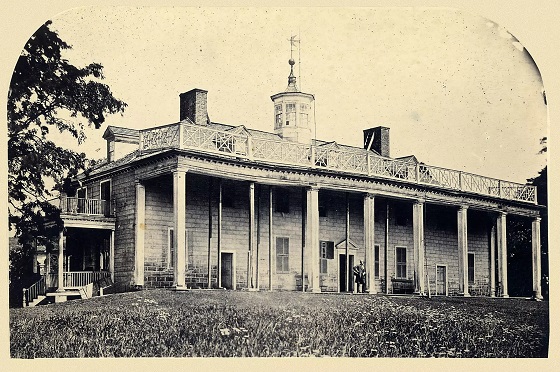Born in 1816, Ann Pamela Cunningham was raised at Rosemont, a plantation on the Saluda River in Laurens County, South Carolina. At the age of seventeen, she suffered an injury to her spine when she was thrown from a horse and was crippled for the rest of her life. In 1853, when she was 37 years of age, she was distressed to receive a letter from her mother describing the neglected, decaying condition of Mount Vernon, the plantation home of George Washington in Virginia.
A Historical Sketch of Miss Cunningham’s life published in 1903 gave more details about the incident that led to her life’s mission:
It was upon a clear moonlit night in 1853 that the mother of Miss Cunningham passed by Mount Vernon. The steamer’s bell tolled out its requiem to the dead hero, whose resting-place, even under the half-tones of moonlight, revealed only neglect and desolation. Reflecting sadly in the silence upon this melancholy scene as it faded in the distance, Mrs. Cunningham realized that unless some immediate effort were made for the preservation of this sacred spot utter ruin would result. But where should the effort begin? Thinking intently—suddenly, like the flash of the star which shot across the heavens, came the inspiration, “Let the women of America own and preserve Mount Vernon!”
When Miss Cunningham read the letter from her mother containing the proposition she said, “I will do it.”
At this time Miss Cunningham was confined to her room a helpless invalid, whose lack of physical strength was compensated by strength of mind and great intellectual ability, accompanied by an enthusiastic, sympathetic nature which accepted no discouragement or rebuff.
When this delicate, sensitive woman declared, “I will do it!” her friends sought, by reason and ridicule, to dissuade her from so wild an undertaking.
Her answer was the letter addressed through our journals to the “Women of America” –an earnest, stirring appeal to their patriotism, urging them to unite in an effort for the rescue and preservation of this neglected Home, this forgotten Grave—to make of Mount Vernon a shrine sacred to the memory of the Father of the Country.
Miss Cunningham founded the Mount Vernon Ladies’ Association for the purpose of raising the sum of $200,000 to purchase and preserve this historic property. Under her leadership, the Association solicited subscriptions for its cause from every part of the country, and in February, 1859, after many struggles and setbacks, the goal was reached.
Miss Cunningham lived at Mount Vernon for a short while before the war, but returned home to Rosemont when her father died. She operated her family plantation throughout the war of 1861-1865, but also continued to administer the affairs of Mount Vernon through correspondence with a resident secretary and a superintendent present there during this time. Due to the efforts and appeals of Miss Cunningham and her secretary Sarah Tracy, both sides, Union and Confederate, held Mount Vernon sacred as neutral ground, although fighting went on in the surrounding countryside.
When the war was over Miss Cunningham returned to Mount Vernon, and despite her worsening health, she worked tirelessly to raise more money to maintain and repair the place. She pressed a claim against the United States government for a steamboat belonging to Mount Vernon which had been impressed and used as a troop transport, and in 1869, Congress finally granted the claim and paid an indemnity of $7000 to be used for the restoration of George Washington’s estate.
Not long before her death, Miss Cunningham sent a farewell address to The Mount Vernon Ladies’ Association in which she wrote:
Ladies, the home of Washington is in your charge…let no irreverent hand change it; no vandal hands desecrate it with the fingers of progress! Those who go to the home in which he lived and died, wish to see in what he lived and died! Let one spot in this grand country of ours be saved from change! Upon you rests this duty!
She died at Rosemont Plantation on May 1, 1875, and was buried in the churchyard of the First Presbyterian Church in Columbia, South Carolina Today, Mount Vernon is still owned and maintained by the organization founded by Ann Pamela Cunningham.







